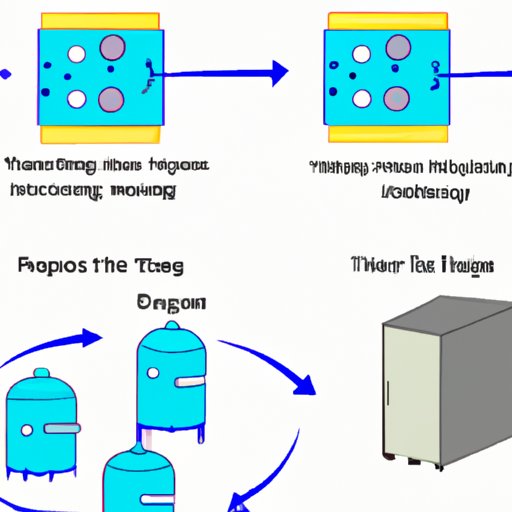Introduction
When you purchase a new refrigerator, one of the most important questions you want to know is how long it will take for it to get cold. This article aims to answer this question by exploring the various factors that influence cooling time, the science behind the process, and some tips to help speed up the process.

Estimating How Long It Takes for a Refrigerator to Get Cold
In general, it takes between 8 and 24 hours for a refrigerator to get cold. The exact cooling time depends on several factors, such as the size and type of refrigerator, the temperature of the room, and the ambient temperature in the area where the refrigerator is located.

Factors That Influence Cooling Time
The size and type of refrigerator are two of the main factors that affect how quickly a refrigerator will cool down. If you have a large refrigerator, it may take longer for it to reach the desired temperature than if you had a smaller one. Similarly, if you have a top-freezer model, it may take longer to cool down than a side-by-side or bottom-freezer model.
The temperature of the room where the refrigerator is placed also affects how quickly it will cool down. If the room is warm, it may take longer for the refrigerator to reach the desired temperature than if the room was cooler. Additionally, the ambient temperature outside the home can also affect the cooling time of the refrigerator. If it is hot outside, it may take longer for the refrigerator to cool down than if the outside temperature was cooler.
The Science Behind How Long It Takes for a Fridge to Cool Down
In order to understand how long it takes for a refrigerator to get cold, it is important to understand the physics of heat transfer. Heat is constantly moving from objects with higher temperatures to objects with lower temperatures. A refrigerator works by transferring the heat from the inside of the unit to the outside through a refrigeration cycle.
The refrigeration cycle begins when the compressor compresses the refrigerant gas, which raises its temperature and pressure. The high-pressure gas then moves to the condenser, where it is cooled and condensed into a liquid. The liquid then moves to the evaporator, which is located inside the refrigerator. The liquid absorbs the heat from the inside of the refrigerator, turning it back into a gas. The gas is then returned to the compressor, where the cycle starts again. This process continues until the refrigerator has reached the desired temperature.

A Guide to Knowing How Quickly Your Fridge Will Cool Down
When shopping for a new refrigerator, you should consider the following factors in order to determine how quickly it will cool down:
- Size – Larger refrigerators take longer to cool down than smaller ones.
- Type – Top-freezer models take longer to cool down than side-by-side or bottom-freezer models.
- Location – Refrigerators located in warmer rooms or areas with higher ambient temperatures will take longer to cool down.
Tips and Tricks to Speed Up the Cooling Process of a Refrigerator
If you want to speed up the cooling process of your refrigerator, there are a few things you can do. First, you should try to make sure the room where the refrigerator is located is cool. You can do this by closing any windows and doors, using fans or air conditioners, or opening windows or doors to let in cooler air from outside.
You can also use pre-cooling methods to help speed up the cooling process. This includes filling the refrigerator with ice packs, frozen food, or other items to help reduce the amount of heat that needs to be removed from the interior of the refrigerator.
Conclusion
In conclusion, it typically takes 8-24 hours for a refrigerator to get cold. The exact cooling time depends on the size and type of refrigerator, the temperature of the room where it is located, and the ambient temperature outside the home. Understanding the science behind heat transfer and the refrigeration cycle can help you understand why it takes so long for a refrigerator to get cold. Additionally, there are several tips and tricks that can help speed up the cooling process, such as pre-cooling the refrigerator and making sure the room is cool.
With these tips in mind, you can now make an informed decision when purchasing a new refrigerator based on how quickly it will cool down.


